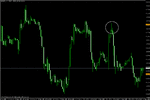The fact is that mutual funds, unit trusts, investment trusts and pension funds are primarily managed by fundamentalists. Those who will tell you that for example fibs work because "lots of traders look at them", will then say fundamentals don't count ignoring the fact that fund managers swinging a bigger stick primarily make their decisions on based fundamentals.
A lot of big fund managers trade based on fundamentals. After all,
it's big money that creates a pattern on the chart in the first place. This is why a fundamental shift in the economy comes out in the stock market (a chart) first, before it's translated into an economic indicator or a company report. Technicians look for these signals, perhaps through indicators or through price/volume movement, but they aren't responsible for initiating the moves themselves. This doesn't change the fact that
fundamentals come out in the chart first.
Those who look for 'fundamentals' are usually looking at either - depending on whether they trade an ETF/index or a stock - statistics about the economy as a whole (GDP, CPI, interest rate, trade balance,...) or statistics about the company (P/E, dividends, earnings, projections,...). They forget that these numbers are nothing but translations of something which has happened before, these are
by definition lagging indicators. Therefore, by following the fundamentals you are always two steps behind.
The market turns upwards or downwards because those with the big bucks have determined that the current prices are not correctly related to, what they perceive to be as, their fundamental value. But 'fundamental value' isn't translated into an indicator that comes out two or three months later. Which is why
all those who think they study fundamentals, are only studying the effects of a fundamental shift that already took place.
A stock that is basing, is exhibiting patterns of accumulation because a select number of people (with "a bigger stick") perceive it to be lower then the real value. They believe the 'fundamentals' of that corporation are fine. But at this moment, the news is usually bad, earnings are worse than expected and jobs are being cut. The accumulation pattern however, comes out in the chart
before - usually couple of months later - a rise in earnings or a increase in sales becomes public knowledge.
Yes, fundamentals have a casual relationship with price, technical analysts don't move price. It's not because a trendline breaks or an MA crosses over (or a Fib line is drawn somewhere on a chart) that price will move lower.
Fundamentals are the driver behind the markets, but technicals are what helps you determine in which direction the market is moving, before the fundamentals become common knowledge.
Whether or not mutual/pension funds are managed by fundamentalists or technicians, I couldn't care. Fact is that a lot of hedge funds lost loads of money in the last year, pension funds continue to stumble and 'the professional money' has to fight with other professional money as well. It's not because it's big or professional money, that's it's per definition smart money all of the time.

